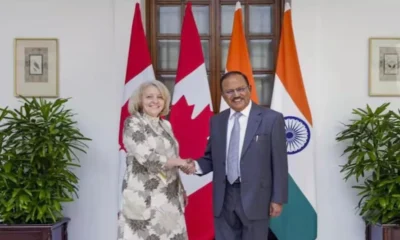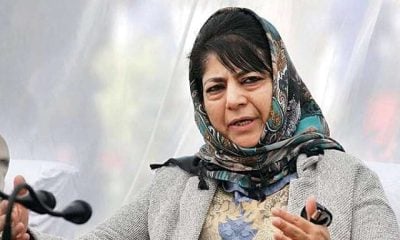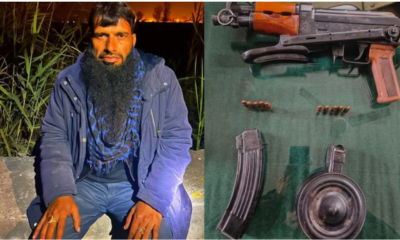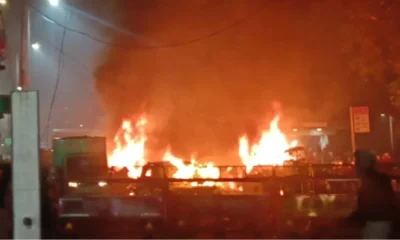The Union Ministry of Home Affairs is sending in additional 100 companies – approximately 10,000 troops – of central armed police forces (CAPF) to Jammu and Kashmir to “strengthen CI grid as well as for maintaining law and order.”
The decision came after National Security Advisor Ajit Doval returned from a two-day visit to Kashmir valley. The state is still under the President’s rule.
The order, from the Ministry of Home Affairs directed to the J&K Chief Secretary, Home Secretary and the Director General of Police (DGP), says the central forces are being inducted “with immediate effect.”
The 100 companies will comprise of 50 companies of Central Reserve Police Force (CRPF), 10 companies of Border Security Force (BSF), 30 of Sashastra Seema Bal (SSB) and 10 of Indo-Tibetan Border Police (ITBP).
The letter sent by Mukesh Taterway of the Central Home Ministry’s J&K division reads, “In order to strengthen counter insurgency grid as well as for maintaining law and order situation in J&K, deployment of additional 100 companies of CAPFs shall be made.”
J&K DGP Dilbag Singh said they have already requisitioned for these troops for deployment in north Kashmir.
Top police sources explained this move as “a relief to over stretched training cops on duty since panchayat elections last year.”
“There are less troops in north Kashmir and that’s why we need additional forces. 100 companies have been airlifted and that’s what we had asked for,” said Dilbag Singh. A company has around 100 troops each.
Recently, around 40,000 additional central paramilitary forces were brought in for Amarnath Yatra security.
On February 24, around 100 companies of central paramilitary forces were airlifted and deployed in the valley, 10 days after the February 14 IED explosion at Lethpora, Pulwama, that claimed the lives of at least 40 CRPF personnel. The government had said the troops were deployed for the Lok Sabha election held in April and May. It was followed by a ban on Jamaat-e-Islami and a major crackdown on its leaders and supporters in the state.
Dilbag Singh said any other motive attributed to the troop induction is only speculation.
The move was slammed by some activists and politicians of the state. Bureaucrat turned politician Shah Faesal was the first to react to the MHA letter being circulated widely on social media.
Also Read: Mumbai rains: NDRF rescues 500 from stranded Mahalaxmi Express, operation on
“This MHA communique regarding deployment of additional 100 Coys of CAPF is fueling huge anxiety in Kashmir. No one knows why this sudden mobilization of forces is being done. Rumor is that something sinister is about to happen. Article 35a? It is going to be a long night,” he posted on his Twitter handle.
PDP chief and former J&K Chief Minister Mehbooba Mufti tweeted that J&K problem couldn’t be solved militarily. “Centre’s decision to deploy additional 10,000 troops to the valley has created fear psychosis amongst people. There is no dearth of security forces in Kashmir. J&K is a political problem which won’t be solved by military means. GOI needs to rethink & overhaul its policy,” she said.
Speculation around the movie is also focused on the removal of Article 35A, which defines state subject laws in the State. Article 35A grants Jammu and Kashmir legislature the right to determine the criteria for permanent residency in the state, it also empowers the Assembly to bestow residents with special rights and privileges for acquiring property in the state and appointment to government jobs among others. All legislation coming under Article 35A are immune to any legal challenge.
Also Read: Delhi based lawyer denies organizing any formal camp in Lucknow on obtaining gun license
Inspector General (IG), CRPF Kashmir zone, Rakesh Kumar told a news channel that the additional troop deployment was routine exercise to maintain law and order and for counter insurgency operations and there was no need to read between the lines, he said.
Additional 100 CAPF companies were also deployed to the state in February this year after 40 CRPF jawans were killed in a suicide attack in Pulwama and before Indian Air Force carried out air raids against JeM hideout located in Pakistan’s Balakot.


 Latest world news14 hours ago
Latest world news14 hours ago
 Latest world news14 hours ago
Latest world news14 hours ago
 Latest world news13 hours ago
Latest world news13 hours ago
 India News14 hours ago
India News14 hours ago
 India News5 hours ago
India News5 hours ago
 Latest world news4 hours ago
Latest world news4 hours ago














